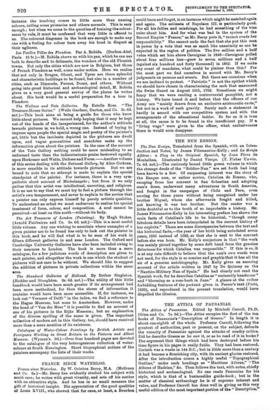THE NUN ENSIGN.
The Nun Ensign, Translated from the Spanish, with an Intro- duction and Notes, by James Fitzmaurice-Kelly ; and La Monjcs. Alferes : a Play in the Original Spanish, by Juan Perez de Montalban. Illustrated by Daniel Vierge. (T. Fisher Unwin. 7s. 6d. net.)—The curiously bound little green volume in which the strange deeds of the "Soldier-Nun" are set forth had long been known to a few. Of surpassing interest was the story of the Basque nun, or rather novice, Catalina de Erauso, who, escaping from her convent in San Sebastian and adopting man's dress, underwent many adventures in South America, and fought in the campaigns of Chile and Peru, even serving for three years without being recognised under her brother Miguel, whom she afterwards fought and killed, not knowing it was her brother. But the reader was a little doubtful as to the truth of so improbable a history. Mr. James Fitzmaurice-Kelly in his interesting preface has shown the main facts of Catalina's life to be historical, "though many fabulous details have been interpolated in the current history of her exploits." There are some discrepancies between the text and the historical facts,—the year of her birth being antedated seven years, 1585 instead of 1592, so that she is sent to the convent before she was born. Mr. Kelly's conjecture is that "the work was mainly pieced together by some deft hand from the genuine Relaciones for which Catalina was responsible." If this is so, it is at any rate difficult to believe that the nun's own words were not used, for the style is so concise and graphic that it has all the air of a genuine autobiography. Mr. Kelly gives an amusing account of the article written in 1847 by Do Quincey on the "Nautico-Military Nun of Spain." He had clearly not read the Spanish work, for he describes Catalina as " eminently handsome" and "blooming as a rose-bush in June." A glance at the rather forbidding features of the portrait given in Ferrer's text (Paris, 1829), and reproduced in the present translation, would have dispelled the illusion.






































































 Previous page
Previous page